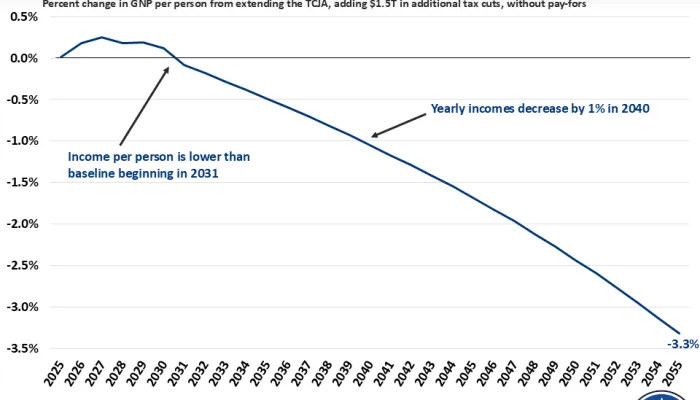‘Line’ Items: Independence Day Edition
More Fireworks in Store – Washington, DC celebrated Independence Day on Monday night with its annual fireworks display on the National Mall. Though the traditional pyrotechnics may be out of the way, lawmakers returning to work today could produce more fireworks in the nation’s capital. The Senate cancelled its planned recess this week to tackle debt limit negotiations, but leaders still appear to be no closer on the matter of whether taxes will be included in a package pairing a debt ceiling increase with deficit reduction. President Obama asked Congress to stay in Washington until a debt limit agreement is reached in a White House press conference on Tuesday. He also called for a balanced approach that includes reductions in defense spending, entitlements, and “spending in the tax code,” also known as tax expenditures. To put it all in perspective, CRFB last week updated its Long-Term Realistic Baseline, which now shows the national debt reaching 88 percent of GDP in 2020 and 140 percent by 2035.
Heading Towards a Short Term Debt Limit Deal? – The Declaration of Independence remains an enduring document 235 years after its adoption. Those negotiating a debt limit increase have a much shorter timeframe in mind, perhaps very short. With no signs of the impasse over taxes being lifted, an increase of a few months is looking more likely. Former President Bill Clinton urged Obama to take such an approach if Republicans don’t budge on taxes, and Sen. John Cornyn (R-TX) hinted on Sunday that things may go in that direction. CRFB offered its thoughts on what the debt limit negotiations should accomplish in a recent paper.
Declaring Independence from Tax Breaks – Tax expenditures have become a popular topic on Capitol Hill as policymakers look for revenues to include in a debt limit deal. President Obama specifically singled out tax breaks for oil and gas companies and corporate jet owners in his Tuesday press conference. Senate Majority Leader Harry Reid (D-NV) said he may schedule a vote on ending a particular tax expenditure or package several together for a vote. Meanwhile, Sens. Amy Klobuchar (D-MN), John Thune (R-SD), and Dianne Feinstein (D-CA) are working on legislation to pare back tax subsidies for ethanol. Also, Sen. Kent Conrad (D-ND) suggested that coupling tax increases with permanent relief from the Alternative Minimum Tax (AMT) could achieve Republican support. See here and here for ideas for eliminating and reducing tax expenditures.
Democratic Budget on Deck – Like throwing burgers on the grill, we can soon add another budget plan to the heat of scrutiny. Sen. Conrad, who is chairman of the Senate Budget Committee, will share his long-awaited budget proposal with his fellow Senate Democrats this week. Conrad says it will contain over $4 trillion in deficit savings over the next decade. But there are still no plans for a committee mark-up because Conrad wants to reserve the budget resolution as a vehicle for a possible debt limit deal. Compare the fiscal plans that have already been released using CRFB’s comparison tool.
Appropriations Bills March Forward – With the House back from its recess, the parade of FY 2012 spending bills will continue. Floor action on the Defense appropriation measure will resume with votes on amendments and final passage expected this week. The Energy-Water spending bill is next in line for floor consideration. On the other side of the Capitol, the Senate Appropriations Committee adopted its first spending bill (Military Construction-Veterans Affairs) last week, with a price tag of $142 billion. But work on other bills is not expected as the chamber has yet to agree on a top-line spending figure to guide the process. With the budget process becoming more drawn out, the ideas offered by the Peterson-Pew Commission on Budget Reform for making the process more functional in Getting Back in the Black are becoming more essential.
More Warnings on Debt Limit – Like Paul Revere making his famous ride, there are plenty of voices warning of the perils of the forthcoming debt limit deadline, which the Treasury Department reaffirmed is August 2. Bond rating firm Standard & Poor’s warned that failure to increase the debt ceiling would result in a swift lowering of the U.S. credit rating. And a detailed analysis by the Bipartisan Policy Center illustrates the effects on government operations that will ensue if the limit is not raised by early August. Check out CRFB’s ongoing Debt Ceiling Watch to stay abreast of the “extraordinary measures” being taken by the Treasury Department to avoid breaching the limit.
Medicare Changes Considered – The New York Times reports that the White House is offering Medicare and Medicaid cuts as part of a debt limit deal, contingent on if Republicans agree to revenue increases. In addition, last week Sens. Joe Lieberman (ID-CT) and Tom Coburn (R-OK), introduced Medicare reform legislation designed to strengthen the program’s long-term finances and save over $600 billion over ten years. See some ideas from CRFB for health care savings.
Spending Cap Bill Introduced – While many removed their caps at some point this weekend for the national anthem, Sen. Pat Toomey wants to put on a cap, namely a cap on federal spending. He unveiled legislation last week that divides federal spending into six categories with different caps. For example, non-discretionary defense spending would be reduced to $435 billion in 2012, frozen at that level for seven years and then indexed to inflation thereafter. CRFB has provided a handy Fiscal Toolbox that summarizes and compares various budget tools being discussed to reduce the national debt, such as spending caps and debt triggers. See more budget resources here.
Promoting Bipartisanship – Just as the signers of the Declaration of Independence cast aside ideological differences in agreeing on the document, Sen. Mark Udall (D-CO) is seeking that same spirit in addressing the debt. He is circulating a letter for signatures supporting a bipartisan approach to addressing the national debt using the recommendations from the White House Fiscal Commission as a template. Meanwhile, the Moment of Truth Project, which is led by Fiscal Commission Co-chairs Sen. Alan Simpson and Erskine Bowles and “aims to use the Fiscal Commission’s findings to spark a national discussion on the need to implement a comprehensive budget fix, and to help further develop the policy reforms to improve the nation’s fiscal outlook,” launched its new website last week, along with an updated estimate of the Commission’s proposal.
Rockefeller Rolls Out Ideas – Sen. Jay Rockefeller (D-WV) has put forth his ideas for reducing the deficit. His 18 proposals, all on the revenue side, would reduce the deficit by $1.29 trillion over ten years, according to his office. Recommendations include eliminating tax breaks for oil and ethanol, ending the 2001/2003/2010 tax cuts for the wealthy, and capping itemized tax deductions.
Key Upcoming Dates
July 6
- White House Twitter Townhall on the economy and jobs at 2:00 pm.
July 7
- House Budget Committee hearing on “Budgeting for America’s National Security” at 10:00 am.
July 8
- House Ways and Means Committee hearing on Social Security’s finances at 9:00 am.
August 2
- Treasury Secretary Geithner says that the U.S. will default on its obligations by around August 2 if the statutory debt ceiling is not increased before then.


